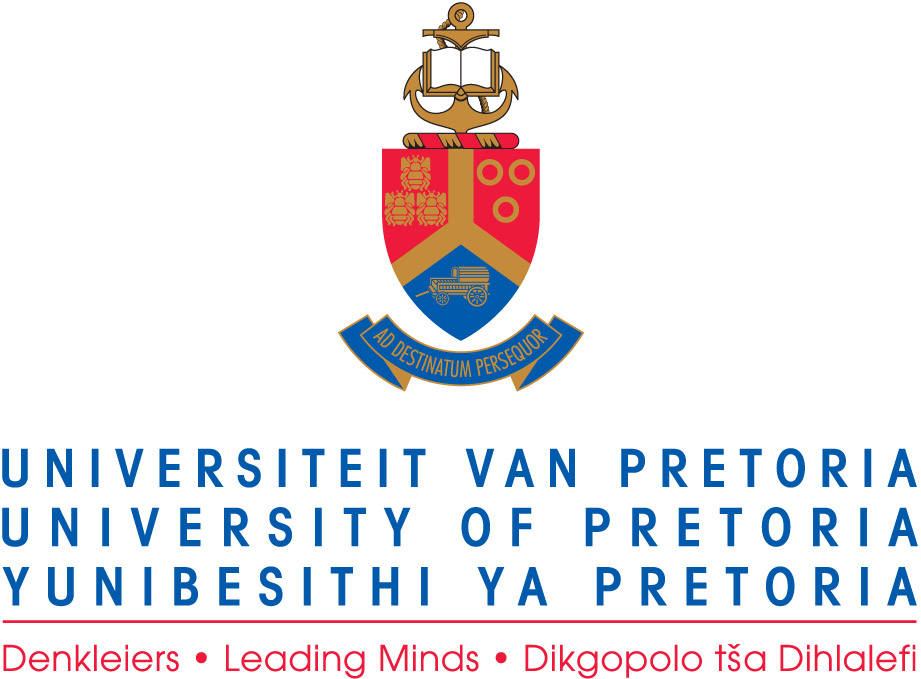Location
Vision
To be a leading research‐intensive university in Africa, recognised internationally for its quality, relevance and impact, as also for developing people, creating knowledge and making a difference locally and globally.
Mission
In pursuing recognition and excellence in its core functions of research, teaching and learning, and integrating engagement with society and communities into these, the University of Pretoria will use quality, relevance, diversity and sustainability as its navigational markers.
Values
The members of the University of Pretoria believe that:
our community of scholars must be founded on the pursuit of knowledge through research, teaching and learning, with membership acquired on the basis of intellectual merit, ability and the potential for excellence; and that
differing perspectives, arising from diverse backgrounds and histories that define our identities, deepen scholarly inquiry and enrich academic debate.
We cherish:
academic freedom, creative and innovative thought, ethical standards and integrity, accountability and social justice; and
our staff and students as the University’s core asset.
We foster:
an inquiry‐led and evidence‐based approach to creating knowledge; and
academic citizenship, whereby we commit ourselves to harnessing our intellectual abilities in the interest of our nation and humanity.
We recognise that:
in a resource‐constrained world where vast disparities remain, the University must endeavour to produce graduates who appreciate the importance of community service, entrepreneurial endeavours and innovative actions in generating employment and development in our local communities.
Members:
Resources
Displaying 1 - 5 of 9The impact of agricultural extension on farmers’ technical efficiencies in Ethiopia: A stochastic production frontier approach
Background: To address the structural food deficit and top down extension system that persisted for decades, the government of Ethiopia has introduced a new extension system, called Participatory Demonstration and Training Extension Systems, which serves more than 80% of the total population. As the program was streamlined to fit the different agro-climatic condition of the country, the extension approach practiced in the Tigray region (research area) was called Integrated Household Extension Program.
Micro-enterprise predicament in township economic development: Evidence from Ivory Park and Tembisa
Background: In South Africa, the idea that the township economy needs to be ‘revitalised’ has begun to gain significant political traction. The Gauteng provincial government has responded to this challenge by setting out a strategy that promises to channel resources and create opportunities for micro-enterprises. The paper responds to development interventions such as this through interrogating the nature of the challenges facing micro-enterprises that need to be overcome in South African townships.
Revitalized agriculture for balanced growth and resilient livelihoods: Towards a rural development strategy for Mon State
The purpose of this policy brief is to provide national and state-level policymakers, private sector investors, civil society and donors with an analysis of the rural economy of Mon State and pathways to improved prosperity for its population. The analysis is based on a representative survey (the Mon State Rural Household Survey 2015) of 1680 rural households, which comprise 73% of Mon State’s 2 million residents, and extensive interviews with farmers, traders, processors, local leaders and government officials.
Revitalized agriculture for balanced growth and resilient livelihoods: Toward a rural development strategy for Mon State
The purpose of this report is to provide national- and state-level policymakers, private-sector investors, civil society, and donors with an analysis of the rural economy of Mon State and pathways to improved prosperity for its population. The analysis is based on a representative survey of rural households, which make up 73 percent of Mon State’s 2 million residents, and extensive interviews with farmers, traders, processors, local leaders, and government officials.
Rural livelihoods in Mon State: Evidence from a representative household survey
The purpose of this report is to provide information and analysis to government, civil society, and donors interested in improving the well-being of the rural population of Mon State. Specifically, the report analyzes the different sources of income for rural households, as well as their socioeconomic characteristics, with a view to identifying potential pathways to improving incomes, especially for poor households, and stimulating inclusive rural growth.





